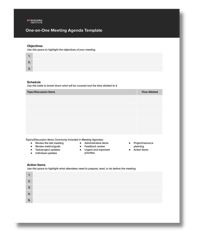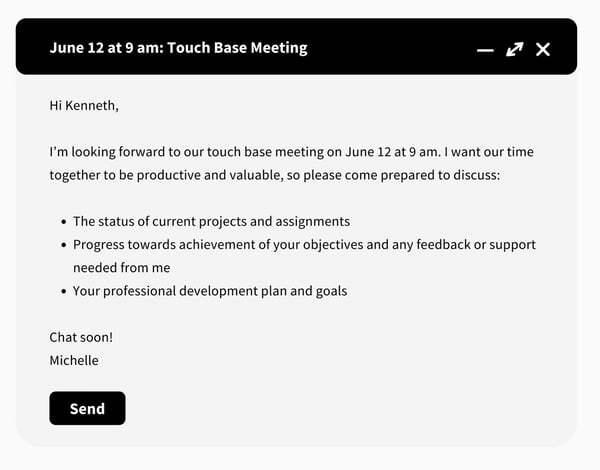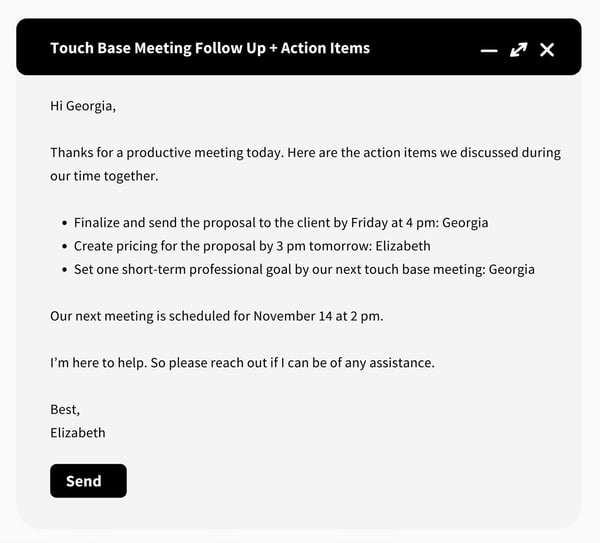8 min read
10 Best Free Resources to Ace a Kickoff Meeting
Leading a new project, forming a new team, or taking over an existing one can be exciting and daunting, and the kickoff meeting is the first...

Whether you call them a one-on-one, catch-up, huddle, or touch base meeting, these are opportunities for each of your team members to discuss ideas, thoughts, challenges, and goals. It's one-on-one time dedicated to sharing feedback, updates, progress towards objectives, and accountabilities.
Creating the time, space, and opportunity for every individual on your team to have your focused attention can go a long way for engagement, productivity, and performance. However, to obtain the benefits of these touching base meetings, just getting together isn’t enough. Touch base meetings must be thought out and structured if they’re going to add value. Career conversations within these touch base meetings must be thought out and structured if they’re going to add value.
To help you prepare for your next touch-base meeting, we’ve compiled four best practices to ensure your meeting hits all the critical elements of a great meeting.
 Before scheduling a one-on-one meeting with an employee, you must establish a touch base meeting agenda and attach it to the invite. A meeting agenda helps give a meeting structure, as it guides you and your employees on the topics you need to discuss. It also helps your employees prepare for touch base meetings as it outlines the items you'd like to discuss, guiding them on what materials to collect and information to find beforehand.
Before scheduling a one-on-one meeting with an employee, you must establish a touch base meeting agenda and attach it to the invite. A meeting agenda helps give a meeting structure, as it guides you and your employees on the topics you need to discuss. It also helps your employees prepare for touch base meetings as it outlines the items you'd like to discuss, guiding them on what materials to collect and information to find beforehand.
To set the stage for your touch base meeting, you’ll want to send a meeting invitation that includes all the relevant information, expectations, and any documents to be reviewed. Ensure your touch base meeting email invite has the following:
Here is an example of a good touch base meeting email invite:

To ensure it is a valuable and productive use of time, structure your weekly catch-up meetings using the Three R’s: Rapport, Review, and Readiness.
First 10 Minutes: Rapport
The first 10 minutes of a touch base meeting build rapport and trust. Building a relationship with each employee and earning their trust is time well spent. Ask them questions about what they enjoy, their hobbies, and what’s important to them. Share your own stories to show the human side to you. The key is to be open, authentic, and take a sincere interest in them, the person, not just the employee.
Why This Works: Sadly, an HBR survey uncovered that 58% of respondents said they trust a stranger more than their manager. Dedicating a third of your touch base meeting to getting to know them, the whole them, and listening to their concerns and challenges build solid relationships anchored in trust. When you have a trusting relationship, your team members are more likely to come to you when there is a real problem or they’re struggling. This allows you to help them in a bind or fix something before they resign.
Middle 10 Minutes: Review
Once you’ve established rapport, now it’s time to get into the thick of the meeting. The next ten minutes or so are dedicated to reviewing the status of projects, objectives, and goals and providing feedback, encouragement, and help as they need it.
Why This Works: If you’re regularly in touch with your team and projects and objectives, you shouldn’t need more than ten minutes to cover these topics. Focus the time on support and feedback. Your employees want feedback from you, and a touch base meeting is an ideal time to deliver it. A Gallup study asked, “I have received meaningful feedback in the past week.” 84% who strongly agreed with that statement were engaged with their work as compared to only 22% from all other categories.
Last 10 Minutes: Readiness
The last 10 minutes are dedicated to development. Let them take the lead in discussing areas for improvement, their career ambitions, and where they want to grow. Allow them to define success for themselves. Dig deeper to uncover how you can best support their development and professional goals.
Why This Works: Career conversations go a long way in demonstrating you’re invested and want to help your employee achieve their goals. These conversations motivate employees to do their best work and strive for professional goals. A survey by Right Management confirmed the link between career conversations and engagement. They uncovered that 82% of respondents said they would be more engaged in their role if their leader had a regular career conversation with them.
For a touch base meeting to be deemed great, action items must be followed up on after the meeting to move closer to attaining objectives or goals. Draw up action items throughout the meeting with an owner, a clear description, and a deadline. Send these items in a post-meeting email or Slack chat so you and your employee have your accountabilities in writing.
Here is an example of a good follow-up email to send after a touch base meeting:


8 min read
Leading a new project, forming a new team, or taking over an existing one can be exciting and daunting, and the kickoff meeting is the first...

6 min read
Staying connected with your boss, your direct reports, and your peers has never been more important than over the last 18 months. Whatever you call...

8 min read
No one should go into a one-on-one meeting unprepared. If you do, it can send a message to the person you’re meeting with that you don’t fully...